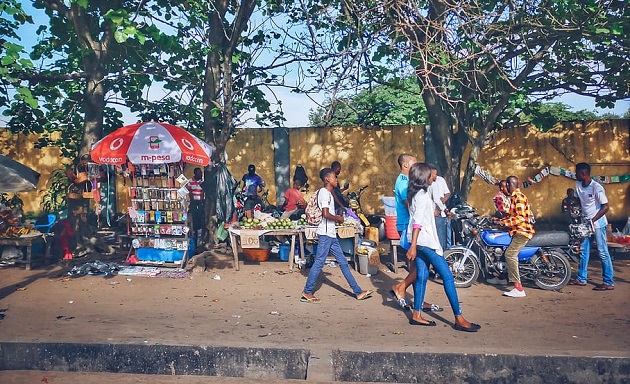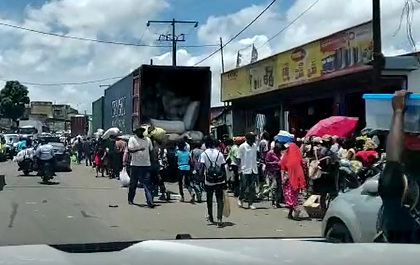Confinement in African cities equals keeping people at home with hunger
As the epidemic rages in Europe, let us not forget that worldwide inequalities mean that some countries will be more affected than others.
28 MARCH 2020 · 13:00 CET

A year and three months ago, I underwent approximately 30 days of confinement. In an Ebola-stricken area and in the midst of a tense post-electoral period, the Congolese government had decided to cut the access to internet until the final results would be announced.
I was not completely cut off from everything because the organization I used to work for had satellite connection, but still, I was posted in a dangerous area and the curfew was set at 6 pm.
So when I found out that I would be confined in my beautiful apartment in a European capital, being able to work from home, with good internet, an amazing kitchen to cook in, my collection of books, my music instruments, and my subscriptions to music and video streaming, I thought “this is not going to be so bad” and thanked God for these blessings.
Probably because I have family in the South of Europe and I saw it coming, I bought groceries before the panic shopping. As I put one by one all the food items in the fridge and freezer, calculating that it could last me at least 10 to 15 days, I was at that point still completely oblivious to the possible consequences of the epidemic on Europe. And I honestly did not think once about the time where I had no (working) fridge and food had to be bought every two days at the market.
But only a few days later, my phone started buzzing. A message from a former colleague in DRC wished me blessings and protection during the epidemic. In a Whatsapp group, brothers and sisters from Madagascar, Togo, Benin checked on us Spanish, Belgian and French. This was new.
This was also very humbling. Especially when I started thinking about two things. one, there is nothing on the news about Africa. One case in Senegal? Two in Nigeria? Where do I find this information? Two, this is going to be terrible for Africa. Much, much, much worse than for Europe. And the only thing they think of is: checking on us! And letting us know they are praying for us!
COVID-19 : UPDATE IN AFRICA, 27 MARCH 2020 - 9:00 am EAT
— Africa CDC (@AfricaCDC) March 27, 2020
Countries (46) reporting a total #COVID19 3,243 cases, 83 deaths, 254 recoveries by region.#COVID19 #FactsNotFear # AfricaPrepares # AfricaRespond pic.twitter.com/05hruMG3Hx
Probably like many of you, I could never have imagined the worldwide impact of that small weird epidemic that started in Wuhan. I did not pray for Wuhan, or maybe a short prayer escaped my mouth for “Chinese Christians” when I received the amazing news of how Christians were witnessing through this epidemic.
There are always more urgent prayers. But above all, there are always more urgent things to do. It is already hard to pray for what we know, and much harder to pray for what we do not know, to “feel” a “connection” with those brothers and sisters in Christ who live in those countries where we do not understand the culture, the context, the challenges they face… In these few lines, I will attempt to bring (some of) Africa closer to you, so it does not “feel so off”.
As the media were raging last weekend about the developments in Italy and Spain, the vacillations of the UK government and how Trump became a biologist, the president of Guinea (Conakry), taking advantage that everyone was distracted by the epidemic, finally held his highly contested referendum opening the door for his re-election to a third term.
On the other side of the continent, in the Indian Ocean, the Seychelles, a relatively well-off country but with 10% of the population addicted to heroin and that had to exchange its debt for a portion of its waters, saw the last Emirates flight take off with the few tourists that had still dared to travel to the islands this season.
Kinshasa, the largest French-speaking city in the world (estimated at 12 Million in 2017) had thirty confirmed cases on 21 March. A friend working for an international organization sent me a video with the following caption: “They closed the airport, and in theory all should be closed, but look at my commute to work this morning.” (see photo below)

After having lived approximately three years in Africa, I still find it hard to understand how people plan, budget and, in short, live. They go to work in the morning in what they commonly call “business”. My colleague in Senegal works on the same position than me, but then has her own translation consultancy company and designs clothes for her friends, getting her small “sales commission” from the tailor that sews the pieces together.
We walked in the market of central Dakar, and more than 10 people greeted her. “I used to sell bags for this man when I was a student at university” and then “I sold jeans from this little booth to my university friends” she continued. A well-off educated woman, she still juggles between three to four jobs to make ends meet monthly.
But most of the population in big African cities has to make ends meet daily – meaning there are times where they did not sell enough peanuts or cellphone minutes because it rained all day long, and that day they will not eat. Living below the poverty line means that with no capital, no savings, no bank account, people subsist by lending money to family members when they have it, counting on them for survival because in two days or in a week, they will in turn be broke.
Living below the poverty line often also means no electricity and no running water. People survive by buying food daily at the market and by cooking it the same day. They buy tap water disinfected and packed in transparent plastic bags because water bottles are too expensive.
There are no fridges to keep vegetables fresh for two weeks or freezers to keep the leftovers in Tupperwares. Applying a confinement to a city like Kinshasa, Dakar, Abidjan or Nairobi would mean keeping people at home to die of hunger due to lack of means but also due to supply chain deficiencies.
And as we reflect upon how this epidemic will affect the most vulnerable people of our societies – though it is already happening-, might we stop and reflect how this is affecting the inequalities worldwide. “Privilege is invisible to those who have it”, says the sociologist Michael Kimmel. He speaks at TED talks on gender equality, but I believe this applies to any type of privilege. Indeed, I and others as blessed as me complained about our confinement and the restrictions to our leisure. The most vulnerable in our Western societies worry about their jobs. Most of us are concerned about the economic recession coming soon too.
In the meantime, we may thank our Father for having (more or less) functioning governments (and institutions) that are providing support and for benefiting from the best health care systems in the world. We may pray for those countries with bad governments, bad health care and socio-economic systems where confinement equals starvation. And maybe, when the peak of the epidemic is over here, and it will continue raging elsewhere, may we at least continue praying for them?
Joëlle Philippe is communications officer in a small human rights NGO on African issues.She has previously worked for an international organization in the Democratic Republic of Congo.
Published in: Evangelical Focus - Features - Confinement in African cities equals keeping people at home with hunger
